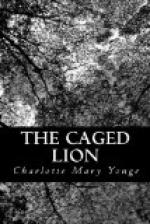The physicians were there. A messenger had gone direct from Corbeil to summon them; and Henry delivered himself up into their hands, to fight out the battle with disease, as he had set himself to fight out many another battle in his time.
A sharp conflict it was—between a keen and aggravated disease, apparently pleurisy coming upon pulmonary affection of long standing, and a strong and resolute nature, unquenched by suffering, and backed by the violent remedies of a half-instructed period. Those who watched him, and strove to fulfil the directions of the physicians, hardly marked the lapse of hours; even though more than one day and night had passed ere in the early twilight of a long summer’s morn he sank into a sleep, his face still distressed, but less acutely, and his breath heavy and labouring, though without the severe pain.
The watchers felt that here might be the turning point, and stood or sat around, not daring to change their postures, or utter the slightest word. Suddenly, James, who stood nearest, leaning against the wall, with his eyes fixed on the face of the sleeper, was aware of a hand on his shoulder, and looking round, saw in the now full light Bedford’s face—so pale, haggard, and replete with anxiety, so dusty and travel-stained, that Henry, awakening at that moment, exclaimed, ‘Ha, John!’ And as his brother was slow to reply—’Has the day gone against thee? How was it? Never fear to speak, brother; thou art safe; and I know thou hast done valiantly. Valour is never lost, whether in defeat or success. Speak, John. Take it not so much to heart.’
‘There has been no battle, Harry,’ said Bedford, gathering voice with difficulty. ’The Dauphin would not abide our coming, but broke up his camp.’
‘Beshrew thee, man!’ said Henry; ’but I thought thou wast just off a flight!’
‘Dost think one can ride fast only for a flight?’ said Bedford. ’Ah, would that it had been the loss of ten battles rather than this!’
And he fell on his knees, grasping Henry’s hand, and hiding his face against the bed, with the same instinct of turning to him for comfort with which the young motherless children of Henry of Bolingbroke, when turned adrift among the rude Beaufort progeny of John of Gaunt, had clung to their eldest brother, and found tenderness in his love and protection in his fearlessness; so that few royal brethren ever loved better than Henry and John of Lancaster.
‘It was well and kindly done, John,’ said Henry; ’and thou hast come at a good time; for, thanks be to God, the pain hath left me; and if it were not for this burthen of heaviness and weariness, I should be more at ease than I have been for many weeks.’
But as he spoke, there was that both in his face and voice that chilled with a dread certainty the hearts of those who hung over him.
‘Is my wife come? I could see her now,’ he wistfully asked.
Alas! no. Sir Lewis Robsart, the knight attached to her service, faltered, with a certain shame and difficulty, that the Queen would come when her orisons at Notre Dame were performed.




